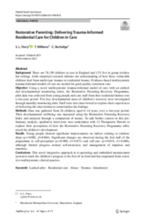Displaying 241 - 250 of 1185
This article explores the concept of care and the responsibility assumed by ‘states’ when taking children into care.
According to this article from BBC News, campaign groups in the UK have called attention to the lack of available face-to-face contact for children with parents who are incarcerated, which they say is "crucial in maintaining the relationship between imprisoned parents and children."
According to this article from the Guardian, "thousands of children of EU citizens who have been taken into care may become 'undocumented' adults with no right to work, rent a home or receive benefits, a charity has warned."
Using a novel multisystemic trauma-informed model of care with an embedded developmental monitoring index, the Restorative Parenting Recovery Programme, pilot data was collected from young people and care staff from four residential homes over a two-year period.
This free online session will introduce emerging adulthood theory as a social concept and will explore and address its implications for Scotland's care system.
"Babies and children are still being removed from families unnecessarily, according to the chief social worker for children and families in England," says this article from the Sunday Times.
This article seeks to echo the voices of 36 children aged 10 to 12 who participated in a therapeutic primary to secondary transition initiative for looked after children.
This research focuses on Somalis living in a large English city where there is a significant shortage of Somali foster carers and adopters despite people of Somali heritage comprising a sizeable proportion of the care and city population.
This article seeks to echo the voices of 36 children aged 10 to 12 who participated in a therapeutic primary to secondary transition initiative for looked after children. Informed by a participatory action research approach, its focus was to facilitate the child’s voice.
This paper reports on a small-scale, qualitative evaluation of an approach to working with children in care launched in Brighton and Hove called Me and My World. Core principles of the model are explained including continuity of relationship between social workers and children in care; a statutory review process which promotes participation of the child and young person and a recording system where social workers, IRO’s and foster carers write reports for review directly to the child.

